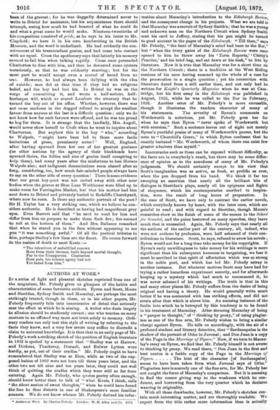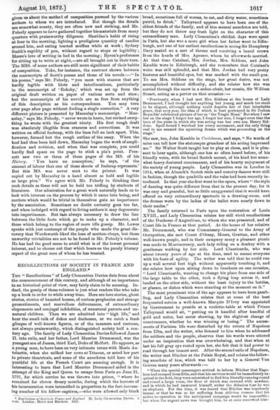AUTHORS AT WORK.* Le a series of light and pleasant
sketches reprinted from one of the magazines, Mr. Pebody gives us glimpses of the habits and characteristics of some favourite authors. Byron and Scott, Moore and Sheridan, Sydney Smith and Macaulay, are perhaps the most strikingly treated, though in these, as in his other papers, Mr. Rebody frequently falls into inaccuracies of detail that seriously mar the effect at which he is aiming. A writer who deals largely in allusion should be studiously correct ; one who touches on many .matters in an offhand way must not trust solely to memory. Ordi- nary readers can only test this style of writing by referring to the 'facts they know, and a very few errors may suffice to discredit a claim to universal knowledge. It is thus that in an early page of Mr. rebody'a work a striking sketch of the position of English literature in 1802 is spoiled by a statement that " Shelley was at Harrow, and Dickens, Thackeray, Disraeli, and 'Rawer Lytton were .hardly, as yet, out of their cradles." Mr. Pebody ought to have remembered that Shelley was at Eton, while as two of the sup- ,posed babies of 1802 were not born till three years later, and the -other two not till nine and ten years later, they could not well .think of quitting the cradles which they were still so far from .entering. Again Mr. Pebody, who quotes poetry often enough, .should know better than to talk of " what Keats, I think, calls the silent session of sweet thoughts,' " when he could have found the line he thus distorts in one of Shakespeare's most familiar sonneta. We do not know whence Mr. Pebody derived his infer-
* Authors el Work. By Charles Pabody. London: W. H. Allen and Co. 1872.
mation about Macaulay's introduction to the Edinburgh Review, and the consequent change in his projects. What we are told is that Macaulay was &recruit of Sydney Smith's; that he was a young and unknown man on the Northern Circuit when Sydney Smith sent his card to Jeffrey, stating that his pen might be turned to good account in the pages of the Edinburgh. "Till then," says Mr. Pebody, " the bent of Macaulay's mind had been to the Bar," but " when the ivory gates of the Edinburgh Review were once opened to him he threw away his ' Term Reports,' Chitty's Practice,' and his brief-bag, and sat down at his desk," to live by literature. Now it is true that Macaulay was for a short time on the Northern Circuit ; there is a tradition at the West Riding sessions of his once having summed up the whole of a case for the prosecution in a single question ; yet his connection with literature dated from a still earlier time, and not only had he written for Knight's Quarterly Magazine when he was at Cam- bridge, but his first essay in the Edinburgh was published in August, 1825, while he was called to the Bar in February, 1826. Another error of Mr. Pebody's is more excusable, though it illustrates the random character of many of his statements. The severity of Byron's comments on Wordsworth is notorious, yet Mr. Pebody goes too far when he says that Byron " never spoke of Wordsworth but with aversion." Such a sentence leaves out of sight not merely Byron's youthful praise of many of Wordsworth's poems, but the note to " Churchill's Grave," in which Byron confesses that he exactly imitated "Mr. Wordsworth, of whom there can exist few greater admirers than myself."
Inaccuracies such as these can be exposed without difficulty, as the facts are in everybody's reach, but there may be some differ- ence of opinion as to the soundness of many of Mr. Pebody's judgments. We should certainly except to his view that Scott's imagination was as active, as fresh, as prolific as ever, when the pen dropped from his hand. We think it far too sweeping an assertion that nearly all the brilliant bits of dialogue in Sheridan's plays, nearly all his epigrams and flights of eloquence, which his contemporaries ascribed to inspira- tion, were the result of long hours of preparation. In the case of Scott, we have only to contrast the earlier novels, which everybody knows by heart, with the later ones, which are painful to read ; and with regard to Sheridan, though Moore's researches show us the finish of some of the scenes in the School for Scandal, and the pains bestowed on many speeches, they leave much that is unassailed. Again, Mr. Pebody says that nearly all the authors of the earlier part of the century, all, indeed, who were not authors by profession, were half ashamed of their con- tributions to literature. Scott, be says, refused to avow his novels ; Byron would not for a long time take money for his copyrights. If Byron's early unwillingness to take money for his writings is more significant than his subsequent keenness in bargaining, we fear it must be ascribed to that spirit of affectation which was so strong in the noble poet, and which has led Mr. Pebody astray in another instance. But whatever motives Scott may have had for trying a rather hazardous experiment secretly, and for afterwards keeping up a mystery which had much to recommend it, he was never ashamed of his writings. The truth is that in this and many other places Mr. Pebody suffers from the desire of being original and having a theory. He would generally write much better if he was contented with less striking effects, and did not strain after that which is above him. An amusing instance of the faults into which he is betrayed by this tendency is to be found in his treatment of Macaulay. After accusing Macaulay of being a "pauper in thought," of " thinking by proxy," of using plagiar- ism as one of the fine arts, Mr. Pebody wishes to bring a similar charge against Byron. He tells us accordingly, with the air of a profound student and literary detective, that "Sardanapalus is the shadow of the portrait of Otho in Juvenal ; and Don Juan is a copy of the Page in the Marriage of Figaro." Now, if we turn to Macau- lay's essay on Byron, we find that Mr. Pebody himself is not averse to thinking by proxy. We read there, " Don Juan in the first and best cantos is a feeble copy of the Page in the Marriage of Figaro The hint of the character [of Sardanapalue] seems to have been taken from what Juvenal says of Otho." Plagiarism here is scarcely one of the fine arts, for Mr. Pebody has not caught the force of Macaulay's comparison. But it is amusing to find the censor giving way to the weakness which he con- demns, and borrowing from the very quarter which he declares wanting in originality.
With all these drawbacks, however, Mr. Pebody's sketches con- tain much interesting matter, and are thoroughly readable. We expect from the title rather more information than is actually given us about the method of composition pursued by the various authors to whom we are introduced. But though the details are somewhat scanty, they are often new and striking, and Mr. Pebody appears to have gathered together his materials from many quarters with praiseworthy diligence. Sheridan's habit of rising at four in the morning, lighting a prodigious quantity of candles around him, and eating toasted muffins while at work ; Sydney Smith's rapidity of pen, without regard to stops or legibility ; Moore's love of writing in bed in the morning ; Byron's preference for sitting up to write at night,—are all brought out in their turn. The MSS. of some authors are still more significant of their habits of composition. Take, for instance, the contrast shown between the manuscripts of Scott's poems and those of his novels :—" In his poems," says Mr. Pebody, "you meet with stanzas that are hardly legible with blots and interlineations, particularly in the manuscript of Rokeby,' which was set up from the original draft written on paper of various sorts and sizes ; but the manuscripts of his novels are as free from anything of this description as his correspondence. You may turn over page after page without finding a single correction." A very -different picture is presented by Macaulay's manuscript. " Mac- aulay," says Mr. Pebody, " never wrote in haste, but revised every- thing he wrote with the greatest nicety. His first rough draft was absolutely illegible from erasures and corrections. It was written on official foolscap, with the lines full an inch apart. This, however, formed but the rough outline of the essay. When the keel had thus been laid down, Macaulay began the work of ampli- fication and revision, and when that was complete, you could hardly find space on the page to stick a pin's point. Pres- cott saw two or three of these pages of the MS. of his
.History. You have no conception,' he says, of the amount of labour that one of these sheets of foolscap represents.'
But this MS. was never sent to the printer. It was copied out by Macaulay in a hand almost as bold and legible as large pica." We agree with Mr. Pebody in thinking that such details as these will not be held too trifling by students of literature. Our admiration for a great work naturally leads us to look with interest on the process by which it came into being, and matters which would be trivial in themselves gain an importance by the association. Sometimes no doubt curiosity goes too far, and when indulged with regard to living authors it may degenerate into impertinence. But ibis always necessary to draw the line between the little facts which go to make up a character, and those which belong to the region of mere idle gossip. Mr. Lewes speaks with just contempt of the people who made the great dis- covery that Wordsworth liked the lean of mutton-chops, but these unworthy trivialities are not to be found in Mr. Pebody's volume. He has had the good sense to avoid what is of the lowest personal interest, and to choose out that which bears on the purely literary aspect of the great men of whom he has treated.

































 Previous page
Previous page